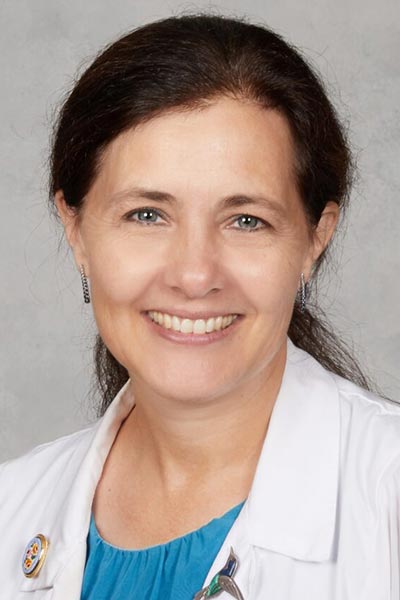
A recent debate between IASLC President Heather Wakelee, MD, and Leiden University Medical Center’s Egbert F. Smit, MD, PhD, made one thing clear: There is not a consensus among thoracic oncologists about the role of neoadjuvant chemoimmunotherapy in non-small cell lung cancer (NSCLC).
During the debate, which took place during the 2023 European Lung Cancer Congress, attendees answered the following question before and after presentations by Drs. Wakelee and Smit.
Is neoadjuvant chemoimmunotherapy superior to adjuvant therapy for all stages of early-stage non-small cell lung cancer?
Following the initial vote, Dr. Smit attempted to convince the audience that neoadjuvant chemoimmunotherapy is superior to adjuvant immunotherapy.
“Administration of immunotherapy before surgery induces an immune response from a larger population of T cells that resides inside the bulk of the tumor,” Dr. Smit said. “They induce a systemic immune response at both the local and distant sites before resection of the tumor bed, thereby leaving behind a larger number of antitumor T cells. In other words, you have a better chance of getting a response at micrometastatic sites with neoadjuvant therapy.”
After reviewing this rationale, Dr. Smit focused on addressing the most cited concerns regarding neoadjuvant therapy in NSCLC:
- Risk of delayed or cancelled surgery or disease progression prior to surgery
- Unexpected surgical complications related to neoadjuvant therapies
Additionally, there is concern there would be a lack of pathological confirmation prior to the initiation of treatment and a risk of overtreatment.
“This we cannot argue,” he said. “It’s true.”
However, Dr. Smit did argue that the first two cited concerns are not true—primarily with data from phase II studies, which Dr. Wakelee would later highlight during her rebuttal.
“Potentially resectable disease that doesn’t get resection due to disease progression is probably dependent on the stage of disease at presentation,” Dr. Smit said.
He cited the phase III CheckMate 816 data where 5% of patients with stage IB had no resection versus 8% of patients with stage III.
“In other words, the more advanced stage at presentation or at inclusion in the trial, the more chance you have of having disease progression,” Dr. Smit said. “What we need to consider is that adjuvant trials include patients at a different point in time. These trials include patients that have R0 resections already. But they don’t tell you how many patients were not included because they had disease progression prior to surgery. How many patients did not complete planned chemotherapy after surgery due to progression of disease? How many patients did not receive immunotherapy after chemotherapy because of progression of disease?
“If you look at the IMpower010 study, I think a conservative estimate is that 7% of the patients did not make it to randomization for immunotherapy or best supportive care due to disease progression. These trials have the same problem as neoadjuvant immunotherapy or adjuvant immunotherapy alone.”
Dr. Smit also reviewed safety data from CheckMate 816 and pointed out that the number of surgery-related adverse events were not significantly different between those patients that received chemoimmunotherapy compared to those who received chemotherapy alone.
“I believe neoadjuvant chemoimmunotherapy has a sound biological rationale,” Dr. Smit concluded. “There actually is no real risk of delay of surgery. There are not real risks of unexpected or excessive adverse surgical events. However, there is clear readout of the antitumor effect of this strategy, and 1-year, 2-year, and 3-year survival rates seems to equal adjuvant chemoimmunotherapy. However, this is with far less treatment, burden to patients, and cost to society, and therefore I think that neoadjuvant chemoimmunotherapy is superior to adjuvant immunotherapy.”

During her response, Dr. Wakelee also explored data from CheckMate 816 as well as phase III adjuvant studies, specifically looking at disease stage and PD(L)1 level, which she said matters even in the neoadjuvant setting. She then focused on providing a contrasting view on potential problems with neoadjuvant therapy.
“Dr. Smit had the same ideas about the things that could make neoadjuvant more challenging, and he tried to refute them,” Dr. Wakelee said. “I’m not sure he did.”
Looking at CheckMate 816 participants by stage, Dr. Wakelee said while it could be argued some of the stage III patients should not have had surgery, most of the stage I/II patients really should have had surgery.
“Then there is the risk of delay,” she said. “When you’re the patient and you’ve just been diagnosed with lung cancer, you want that cancer out. You don’t want to have to wait around and see if chemoimmunotherapy may or may not work. This is a big issue from a patient perspective.”
She also addressed concerns of toxicity and potential for overtreatment with neoadjuvant chemoimmunotherapy.
“Remember, when we talk about immune checkpoint inhibitors, every single organ in the body is at risk,” Dr. Wakelee said. “Name an -itis and it has probably happened to one of your patients if you treat enough patients with checkpoint inhibitors.”
She also stressed the importance of looking at driver mutations before rushing into neoadjuvant therapy to avoid treating patients who may not benefit.
“Is neoadjuvant chemoimmunotherapy superior to adjuvant immunotherapy? No. We should use the right treatment to achieve the best possible outcome—ideally cure—for every patient, but we should not give any more treatment than is necessary to achieve that cure,” Dr. Wakelee concluded.
Following the lively debate, attendees were given a second opportunity to vote, and few minds were changed, it seems.
Is neoadjuvant chemoimmunotherapy superior to adjuvant therapy for all stages of early-stage non-small cell lung cancer?
| First Vote | Second Vote | |
| Yes | 31% | 26% |
| No | 16% | 18% |
| No, only better for stage III | 27% | 25% |
| No, only better for stage II – III | 26% | 21% |





